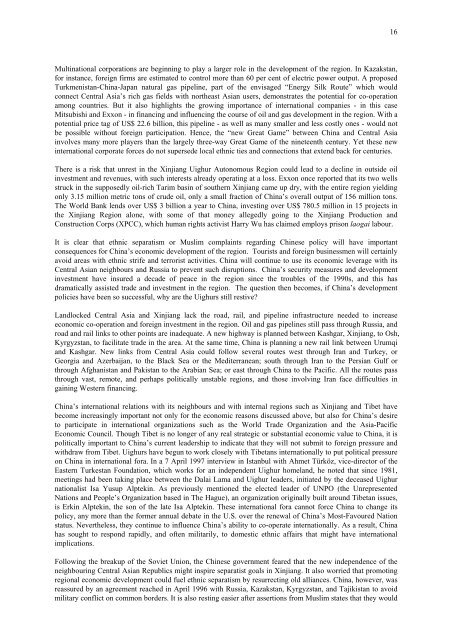Dru C. Gladney, Ph.D. - House Foreign Affairs Committee Democrats
Dru C. Gladney, Ph.D. - House Foreign Affairs Committee Democrats
Dru C. Gladney, Ph.D. - House Foreign Affairs Committee Democrats
You also want an ePaper? Increase the reach of your titles
YUMPU automatically turns print PDFs into web optimized ePapers that Google loves.
16<br />
Multinational corporations are beginning to play a larger role in the development of the region. In Kazakstan,<br />
for instance, foreign firms are estimated to control more than 60 per cent of electric power output. A proposed<br />
Turkmenistan-China-Japan natural gas pipeline, part of the envisaged “Energy Silk Route” which would<br />
connect Central Asia’s rich gas fields with northeast Asian users, demonstrates the potential for co-operation<br />
among countries. But it also highlights the growing importance of international companies - in this case<br />
Mitsubishi and Exxon - in financing and influencing the course of oil and gas development in the region. With a<br />
potential price tag of US$ 22.6 billion, this pipeline - as well as many smaller and less costly ones - would not<br />
be possible without foreign participation. Hence, the “new Great Game” between China and Central Asia<br />
involves many more players than the largely three-way Great Game of the nineteenth century. Yet these new<br />
international corporate forces do not supersede local ethnic ties and connections that extend back for centuries.<br />
There is a risk that unrest in the Xinjiang Uighur Autonomous Region could lead to a decline in outside oil<br />
investment and revenues, with such interests already operating at a loss. Exxon once reported that its two wells<br />
struck in the supposedly oil-rich Tarim basin of southern Xinjiang came up dry, with the entire region yielding<br />
only 3.15 million metric tons of crude oil, only a small fraction of China’s overall output of 156 million tons.<br />
The World Bank lends over US$ 3 billion a year to China, investing over US$ 780.5 million in 15 projects in<br />
the Xinjiang Region alone, with some of that money allegedly going to the Xinjiang Production and<br />
Construction Corps (XPCC), which human rights activist Harry Wu has claimed employs prison laogai labour.<br />
It is clear that ethnic separatism or Muslim complaints regarding Chinese policy will have important<br />
consequences for China’s economic development of the region. Tourists and foreign businessmen will certainly<br />
avoid areas with ethnic strife and terrorist activities. China will continue to use its economic leverage with its<br />
Central Asian neighbours and Russia to prevent such disruptions. China’s security measures and development<br />
investment have insured a decade of peace in the region since the troubles of the 1990s, and this has<br />
dramatically assisted trade and investment in the region. The question then becomes, if China’s development<br />
policies have been so successful, why are the Uighurs still restive<br />
Landlocked Central Asia and Xinjiang lack the road, rail, and pipeline infrastructure needed to increase<br />
economic co-operation and foreign investment in the region. Oil and gas pipelines still pass through Russia, and<br />
road and rail links to other points are inadequate. A new highway is planned between Kashgar, Xinjiang, to Osh,<br />
Kyrgyzstan, to facilitate trade in the area. At the same time, China is planning a new rail link between Urumqi<br />
and Kashgar. New links from Central Asia could follow several routes west through Iran and Turkey, or<br />
Georgia and Azerbaijan, to the Black Sea or the Mediterranean; south through Iran to the Persian Gulf or<br />
through Afghanistan and Pakistan to the Arabian Sea; or east through China to the Pacific. All the routes pass<br />
through vast, remote, and perhaps politically unstable regions, and those involving Iran face difficulties in<br />
gaining Western financing.<br />
China’s international relations with its neighbours and with internal regions such as Xinjiang and Tibet have<br />
become increasingly important not only for the economic reasons discussed above, but also for China’s desire<br />
to participate in international organizations such as the World Trade Organization and the Asia-Pacific<br />
Economic Council. Though Tibet is no longer of any real strategic or substantial economic value to China, it is<br />
politically important to China’s current leadership to indicate that they will not submit to foreign pressure and<br />
withdraw from Tibet. Uighurs have begun to work closely with Tibetans internationally to put political pressure<br />
on China in international fora. In a 7 April 1997 interview in Istanbul with Ahmet Türköz, vice-director of the<br />
Eastern Turkestan Foundation, which works for an independent Uighur homeland, he noted that since 1981,<br />
meetings had been taking place between the Dalai Lama and Uighur leaders, initiated by the deceased Uighur<br />
nationalist Isa Yusup Alptekin. As previously mentioned the elected leader of UNPO (the Unrepresented<br />
Nations and People’s Organization based in The Hague), an organization originally built around Tibetan issues,<br />
is Erkin Alptekin, the son of the late Isa Alptekin. These international fora cannot force China to change its<br />
policy, any more than the former annual debate in the U.S. over the renewal of China’s Most-Favoured Nation<br />
status. Nevertheless, they continue to influence China’s ability to co-operate internationally. As a result, China<br />
has sought to respond rapidly, and often militarily, to domestic ethnic affairs that might have international<br />
implications.<br />
Following the breakup of the Soviet Union, the Chinese government feared that the new independence of the<br />
neighbouring Central Asian Republics might inspire separatist goals in Xinjiang. It also worried that promoting<br />
regional economic development could fuel ethnic separatism by resurrecting old alliances. China, however, was<br />
reassured by an agreement reached in April 1996 with Russia, Kazakstan, Kyrgyzstan, and Tajikistan to avoid<br />
military conflict on common borders. It is also resting easier after assertions from Muslim states that they would











![Transcript [PDF] - House Foreign Affairs Committee Democrats](https://img.yumpu.com/34524080/1/190x245/transcript-pdf-house-foreign-affairs-committee-democrats.jpg?quality=85)



